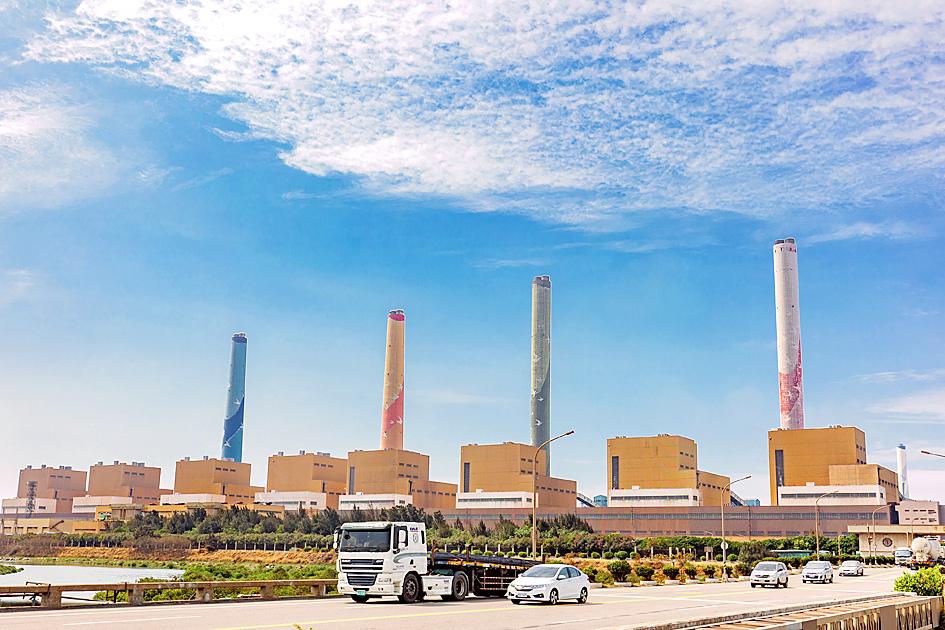Taichung Mayor Lu Shiow-yen (盧秀燕) yesterday accused the Executive Yuan of “ambush” with its announcement on Tuesday night that it had issued a permit for Taiwan Power Co (Taipower) to build two natural gas-powered units at the Taichung Thermal Power Plant.
Lu said the central government had bypassed the local government’s authority to oversee construction at the facility.
“People in central Taiwan are angry and I am lodging a serious protest [against this decision] on behalf of the city government and Taichung resident,” she said.

.Photo copied by Tsai Shu-yuan, Taipei Times
Taichung and the state-owned utility have been at loggerheads over the pollution caused by its coal-fired generators and whether Taipower can add gas-fired generators to the plant.
One of the world’s largest coal-fired plants, the Taichung Power Plant consists of 10 coal-fired generators.
Taipower is planning to add two natural gas-powered units to the plant by 2025 as part of a plan to decrease coal consumption and improve air quality.
The utility said that after installing the two gas-powered units, it would decommission, but not scrap four of its coal-fired generators to have them in reserve to generate power when electricity is in short supply.
That proposal requires the city’s approval, but Taichung’s lack of action after 15 months led the central government to try to bypass local authorities.
The Executive Yuan on Tuesday said it had approved a special building construction permit for Taipower to build the new gas-fired units, and justified its decision with a technical legal argument that said the project did not need the city’s approval.
The Construction and Planning Agency argued in a statement that Taichung’s requirement that the Taichung Power Plant proposal be reviewed under the Urban Planning Act (都市計畫法) exceeded the authority of the Taichung City Government.
It said the city was required by its “Urban Planning Act Self-Government Regulations” to establish the scope of its urban plan and procedures for carrying it out in a detailed plan that would guide the enforcement of the Taipower project.
However, Taichung never completed the process and, thus, trying to review Taipower’s proposal under the law was beyond the scope allowed by the regulations, the agency said.
Because the city did not act in conformity with the law, the application for a special building permit was exempt from the urban design review process, it said, adding that it granted a special construction permit to allow Taipower to proceed with the project.
Lu yesterday reiterated the city’s stance that it was not opposed to building gas-fired units at the plant, but Taipower should first scrap at least some of its existing coal-fired generators.
Moreover, as the new gas-powered units are being built in Taichung, there is no reason why the city government cannot review the project before allowing construction to begin, Lu said.
Even with the agency issuing a special permit, the project still has to be approved in accordance with the self-government regulations on urban planning, Taichung Legal Affairs Bureau Director-General Lee Shan-chih (李善植) said.
Any construction of gas-fired generators at the Taichung Power Plant would be deemed illegal unless it has been approved by the city government, he said.

POSITIVE DEVELOPMENT: Japan and the US are expected to hold in-depth discussions on Taiwan-related issues during the meeting next month, Japanese sources said The holding of a Japan-US leaders’ meeting ahead of US President Donald Trump’s visit to China is positive news for Taiwan, former Japan-Taiwan Exchange Association representative Hiroyasu Izumi said yesterday. After the Liberal Democratic Party’s landslide victory in Japan’s House of Representatives election, Japanese Prime Minister Sanae Takaichi is scheduled to visit the US next month, where she is to meet with Trump ahead of the US president’s planned visit to China from March 31 to April 2 for a meeting with Chinese President Xi Jinping (習近平). Japan and the US are expected to hold in-depth discussions on Taiwan-related issues during the

‘LIKE-MINDED PARTNER’: Tako van Popta said it would be inappropriate to delay signing the deal with Taiwan because of China, adding he would promote the issue Canadian senators have stressed Taiwan’s importance for international trade and expressed enthusiasm for ensuring the Taiwan-Canada trade cooperation framework agreement is implemented this year. Representative to Canada Harry Tseng (曾厚仁) in an interview with the Central News Agency (CNA) said he was increasingly uneasy about Ottawa’s delays in signing the agreement, especially as Ottawa has warmed toward Beijing. There are “no negotiations left. Not only [is it] initialed, we have three versions of the text ready: English, French and Mandarin,” Tseng said. “That tells you how close we are to the final signature.” Tseng said that he hoped Canadian Prime Minister Mark Carney

President William Lai (賴清德) yesterday bestowed one of Taiwan’s highest honors on Saint Vincent and the Grenadines (SVG) Ambassador Andrea Clare Bowman in recognition of her contributions to bilateral ties. “By conferring the Order of Brilliant Star with Grand Cordon on Ambassador Bowman today, I want to sincerely thank her, on behalf of the Taiwanese people, for her outstanding contribution to deepening diplomatic ties between Taiwan and SVG,” Lai said at a ceremony held at the Presidential Office in Taipei. He noted that Bowman became SVG’s first ambassador to Taiwan in 2019 and

A man walks past elementary school artworks at the Taipei Lantern Festival in Ximen District yesterday, the first day of the event. The festival is to run from 5pm to 10pm through March 15.